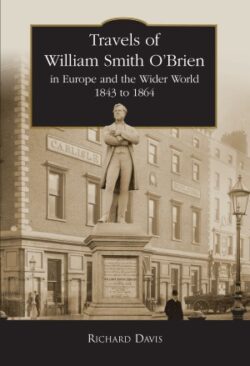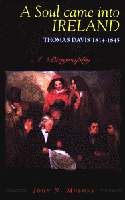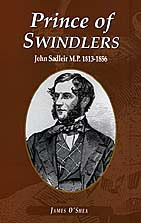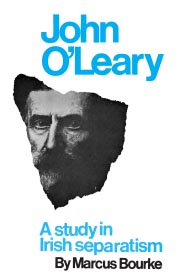Travels of William Smith O’Brien in Europe and the Wider World 1843 to 1864 by Richard Davis
William Smith O’Brien is known in Irish History as the stand-offish if conscientious leader of the failed 1848 Rising. Recently discovered journals prove him a writer of exceptional interest. Both before and after his four and a half years penal exile in Tasmania, O’Brien proved a passionate European traveller and analyst of the conditions and policies of numerous countries. Not till the arrival of Garret FitzGerald in the 20th century was any Irishman so conversant with European political, religious and social developments. Both before and after his free pardon in 1856, O’Brien acted as an unofficial ambassador at large for his country, being honourably received by the President Buchanan of the United States of America, Marshal McMahon, later President of France, and Pope Pius IX.
The book covers tours in Tasmania –Australia 1849-53; Ceylon/India/Egypt 1854; Spain/France 1854; Brussels 1854-5; France/Italy 1855-6; Greece 1856; West of Ireland 1858; USA and Canada 1859; France/Spain/ Portugal 1860; France/Austria/Hungary/Northern Italy 1861; Italy/France 1862-3; Turkey/Romania/Poland 1863.
The recovered Journals show O’Brien to be a man of the future. In Hungary he met Ferenc Deák in the middle of the latter’s successful campaign to achieve constitutional freedom for his country from Austria. Arthur Griffith based early Sinn Féin on Deák’s movement. In Poland he discovered a revolutionary movement against Russia which had many of the characteristics of the Irish War of Independence 1919-21. An ecumenical member of the Church of Ireland, O’Brien showed particular appreciation for the ritual, architecture and theology of the Roman Catholic Church. He was also positive in his discussion of Islam and Hinduism. Wherever he went, O’Brien took particular note of the condition of the working classes, comparing it, usually unfavourably, with that of the Irish under Britain. Only in India did he discover greater poverty. As a keen student of Gaelic, O’Brien was particularly interested in the language and general culture of the lands through which he passed. By more than a century he anticipated Ireland’s role in the European Community.
Richard Davis, in summarising O’Brien’s travel Journals, including that of his Tasmanian exile, has brought to a climax many years of work on Young Ireland. Previous writings include, The Young Ireland Movement (1986), To Solitude Consigned: The Tasmanian Journal of William Smith O’Brien, with a foreword by the Prime Minister of Australia, Paul Keating (1995), and Revolutionary Imperialist: William Smith O’Brien, 1803-1864 (1998). A graduate of Trinity College, Dublin, in the days of the legendary historians, T.W. Moody and F.S.L. Lyons, Davis’s first Irish book was Arthur Griffith and Non-Violent Sinn Féin (1974). Emigrating to the Antipodes in 1960, he continued his work on Irish History, publishing, in addition to works on Ireland, studies of the Irish in New Zealand (1974) and Tasmania (2005). He is now an Emeritus Professor of History of the University of Tasmania and a Fellow of the Australian Academy of Humanities.






There are no reviews yet.